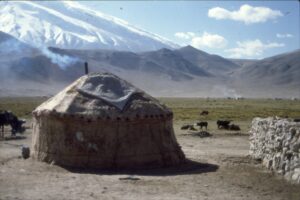
At this time of year, as I review my summer journeys and start to plan the year ahead, my thoughts turn to the way in which we are drawn to travelling. The human race, it seems to me, is constantly on the move, and I have begun to wonder whether movement, restlessness, is an intrinsic part of the human condition.
Small scale and large scale, we wander. Hunter-gatherers cross a territory; farmers, though apparently more settled, still migrate, but in a different way: we are all familiar with the quest for fertile lands, with the fracturing of family, with colonization. There are foundational journeys: ‘Out of Africa’; ‘The Peopling of North America’; ‘The Spread of Agriculture from the Near East’; ‘The Expansion of Trade’. There are small-scale quests: ‘The Exploration of the Poles’; ‘The Brendan Voyage’; ‘Kon-Tiki’. Today many seek short-term relaxation on far-flung shores and in exotic climes. Others undertake life-changing journeys in search of political and economic safety.
Even in the early millennia after the withdrawal of the last great ice sheets it seems that people were forever pushing forwards, that there was always another shore, a more interesting mountain, a better land across the water…
Why?
Why are we so restless? Why are people never satisfied with what we have? Is it as simple as the desire to better our circumstances? Perhaps we are pessimists at heart, always seeking new lands and resources to bolster against hard times? Some have seen our desire to explore as driven by trade and exchange, but, while these have undoubtedly been significant, I’d argue that it is more basic than that. We set out to expand our territories long before we became curious about the goods we might obtain. Trade, for example, requires the concept that we will return with new goods, that people will want them, whereas many of those who set out do so without intending to retrace their steps.
There is another aspect to this that I find fascinating: many of those who travel do so with the aim of seeking the extremes. Today it manifests in an obsession with the north. Is this a peculiarly European trait? Does it define the way we look across the ocean? In the early centuries after the end of the last Ice Age did our ancestors reach the shores of the Atlantic and wish to continue? I’m not sure. There is a vibrant, and growing, literature about the north: places; people; phenomena. It certainly has a respectable antiquity: around 325 BC Pytheas focussed his writings on his travels in the north: the quest for the midnight sun; the strange fauna; the observations of tides and ice. Though he was driven by the desire to pin down the sources and trading networks for significant commodities such as tin and amber, he continued onwards and was surely driven by straightforward geographical curiosity.
I wonder if it is too simplistic to acknowledge some deep instinct that drives us to expand our territories, to move towards the ocean, to reach out across the known world. Some have identified a foundation within our genes, a variant on the dopamine receptor D4, DRD4-7R, known colloquially as ‘The Wanderlust Gene’, though the research is recent and its interpretation is still open to debate. Is this actually a drive for safety, a basic desire to ensure human survival? Did it get us out of Africa? Is it now sending us deeper and deeper into space?
You must be logged in to post a comment.